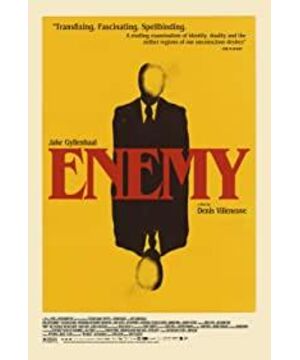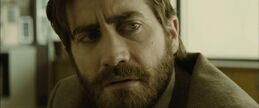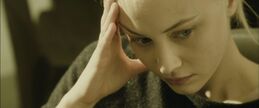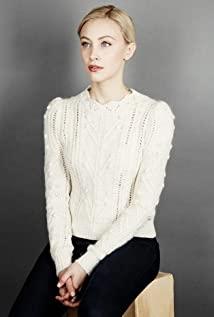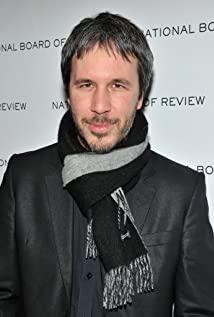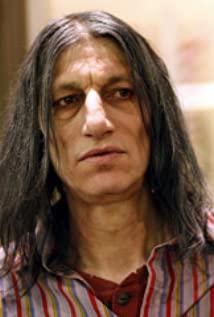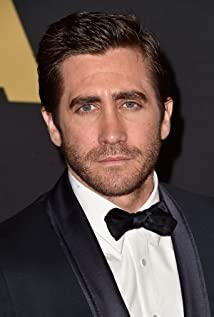Different from the suspense that runs through the whole film created by "The Prisoner", the beginning of "The Enemy" is a bit dull, even boring, and the bland plot almost made me want to fast-forward. But the film finally proved that the thriller was escalated step by step in this seemingly bland plot. At the end of the film, the pregnant wife turned into a huge terrifying spider, and the screen that suddenly dimmed was more like a huge black question mark pressing on every viewer's heart.
The key imagery of the film is the spider, which generally has two symbolic meanings: sex (because the spider's hair resembles pubic hair) and bondage. The bondage generally refers to those mothers who firmly bind their children. It is said that such a mother seems to have a good relationship with her child during the day, but in the child's dream, the mother will turn into a spider and eat herself. Obviously, the latter is the meaning of the spider in this film.
The film begins with a message from a mother who expresses concern for her son's life and wishes to meet and talk with him. At the same time, the face of a middle-aged man was reflected in the front-view mirror of the car. Our protagonist is obviously middle-aged and has a stable job and family, but his mother still advises (controls) him from time to time, which shows how deeply this mother is bound to her child. This is even more direct in the scene where the protagonist meets his mother: the male protagonist obviously doesn't like eating blueberries, but when he rejects his mother, the mother says without question: "Of course you like it." As for the son My mother refused to dream of becoming an actor since I was a child.
When the prey falls into the cobweb, the first thing it wants to do is to struggle to survive (the male protagonist has repeatedly missed his mother's phone calls), but when resistance seems trivial, fantasies arise. That's when the enemy was born.
As for who is the real protagonist in the film, Bell or Anthony, I don't think it is within the director's consideration. It can be seen from the image setting of these two people. Bell has a stable job and is obviously the protagonist under the bondage of his mother, but at the same time he has different feelings in life, tearing up the photo with his wife and living with his young and beautiful lover; Anthony is an actor, with a wild personality, Obviously the protagonist's ideal self, but at the same time he is accompanied by his pregnant wife, and he also likes to eat blueberries that his mother "allows" him to eat (the two also quarrel over blueberries in the film), and the bookshelves are full of history books. From these details, I think it can be considered as follows: from the character, Bell is real, Anthony is fantasy; from the environment, Bell is fantasy, Anthony is real. I think the director's seemingly contradictory setting is actually a reflection of the protagonist's ambivalence.
Assuming that the words of third parties other than the protagonist in the film are true, then we can imagine that the protagonist did have a struggle with his mother earlier. He should have been an actor (the most recent Anthony movie was in 2005, according to online sources), had a beautiful ex-girlfriend, and attended a sex party (presumably after marriage, because the protagonist wears a ring at the party), but All these things were forbidden by the mother one by one. He had to step into the role of his mother's ideal son, become a history teacher, and marry a wife. But deep in his heart, he always yearned for the original life, so the contrast between reality and ideal finally awakened the old enemy in his heart. At the same time, he no longer worries about his mother spying on his real side all the time, so those terrifying spiders appear again and again in his dreams: spiders crawling out of plates at porn parties, dark corridors Walking with a naked girl with a spider's head, in the mist, a huge spider is pacing over the city.••••••
At the end of this torment, the two secretly competing personalities start a head-to-head fight. So the two exchanged their identities, the history teacher returned to his wife, and the actor and his girlfriend went out. This is the result of mutual compromise between the two personalities, and it is also the hero's free hand when he is on the verge of collapse. In the end, the bound self accepted his wife, and the fantasy self and the past memories were buried in a car accident. When the protagonist casually skipped the car accident broadcast the next morning, the fierce personality battle was temporarily brought to an end. The protagonist finally chose the shackles his mother put on him.
But is this really over? Apparently not, when Bell sees the key that takes him to the party, the other self comes alive again, so when he walks into the room he sees the spider instead of his wife - that's what he did to his mother Fear, escape from real life. This is both a visual thriller and a plot twist. The film comes to an abrupt end at this point, leaving the audience to ponder deeply.
What exactly is caring, and what is the difference between love and hindrance? The mother in the movie obviously wants her children to follow the path set by herself, but she forgets that everyone has the right to choose their own path, and restraint will only be counterproductive. The idea of The Swan is somewhat similar.
Split personality is an old theme. There are "American X-Files" and "Fight Club" as far away as "The Mechanic" and "Black Swan", but the director of this film uses a different metaphor to make the film unique in expression. Different, appear "magic". And Jake Gyllenhaal's performance also adds a lot to the film.
View more about Enemy reviews


